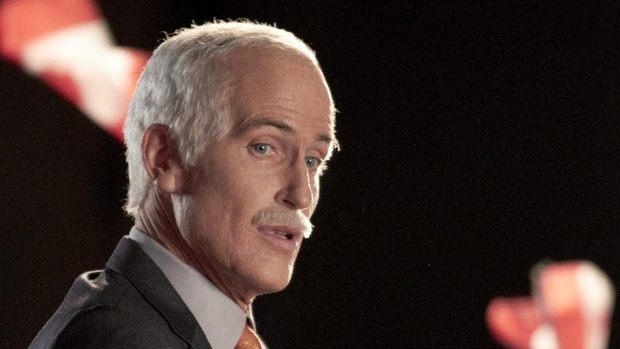Watching a film about Jack Layton barely two years after his most untimely death, there is one question you have to ask: Is it too soon?
The tears are barely dry, and it seems only yesterday the beautiful chalk tributes were scrubbed from Toronto City Hall at the behest of Toronto’s current mayor.
But upon viewing the film, one realizes it will merely be the first of many. Jack Layton’s life was rich with story, and Jack the film is just the first dramatic survey of the life of Jack Layton.
Jack opens on the eve of the 2011 federal election where the NDP, the fourth place party, transfigured itself into the Official Opposition. The hoary party of aging hippies and prairies socialists became, under the tutelage of the urban rainbow warrior, the Orange Crush. That the NDP’s great modern mentor should succumb to cancer within months of the acme of political success made this the stuff of tragedy.
But everybody already knows the ending, so the back story is told in flashbacks. These provide the insight to Jack’s early career in Toronto municipal politics and that most beautiful subplot of Jack’s life, his love affair with Olivia Chow.
One of the funniest scenes in Jack is Layton’s first dinner with Olivia and her mother. Jack has arrived stained with coffee thrown at him by a constituent angry about his taxes being spent to support gay causes. As Jack goofily tries to charm Olivia’s mom, with whom she lives, the older woman expounds in Cantonese about what a loser her daughter has brought home. The scene has a certain verisimilitude about it that makes me want to think it happened just like that. On the second date Jack makes the effort to speak Cantonese and inadvertently thanks Olivia’s mother for great sex.
Similarly hilarious is the scene where Jack grabs a guitar on the tour bus and tries to engage the press in a round of Parachute Club’s ‘Rise Up.’ This is a moment when you feel embarrassed on Jack’s behalf for his unapologetic corniness, and guileless inclusivity. This was a man for whom the idealistic sentiments of the sixties never died. Then you remember this was the song that Jack requested for his funeral and admire the man for singing like nobody’s listening, and turning it into a singalong with the national political press.
The toughest part of making Jack had to be choosing what stories to tell. Any one of Jack Layton’s campaign’s could have made a movie in itself. Jack wisely sticks to the fact that in the ’80s Jack Layton took on the causes of AIDS and the homeless. Similarly the more recent story focused on the 2011 campaign, incorporating stock news footage to good effect. Jack’s preparation for the national leaders debate, and the way he made the cane an icon for strength, are woven into a concise narrative. This political story told by TV news reports is contrasted with the inside story offered by the film. This is an effective way of telling the story of a man beloved for adopting political causes at the beckoning of his heart, and not his handlers.
The most insightful scene of the film is when Jack reveals to a palliative care nurse that he is a politician by trade, and it is a trade he learned from his father (who plied it as a Conservative). This scene rings true because that was the essence of Jack the man. Jack Layton liked to fix things, like a handyman. Except that what Jack liked to fix couldn’t be fixed with hand tools. So he learned to use the tools at hand. Jack Layton worked at politics with a very workmanlike approach, loved his job, and loved to sing while he worked.
The performances in Jack mean never having to say that acting isn’t hard work. Rick Roberts does a workmanlike turn at playing Jack Layton. This is not an easy job given that the charismatic Jack is fresh in memory and will live forever on video. Roberts had to endure a daily grind of prosthetic makeup application and near Deniro weight fluctuations to play the role. And being a Canadian public television production, he did his own stunts (which involved going over the handlebars of a bicycle). Jack would have appreciated the professionalism.
Sook-Yin Lee is a brilliantly understated Olivia Chow. Again, this can’t have been easy as their personae are about as different as two people can get. Diana Ha is a pleasure to watch as Ho Sze, Olivia Chow’s mother. Even when she isn’t saying anything there is Keatonesque (Buster, not Michael) quality about her that lightens mosts scenes in which she appears.
Jack is the kind of production on which the CBC made its reputation. It will unite the nation on Sunday night as Jack’s life is handily evoked upon tubes and plasma screens.
So … it’s not too soon. At the premiere of Jack, Olivia Chow, who shared everything in his life during the period of the film, best answered the question “why now” for a movie about Jack Layton: “…after answering that question for the fortieth time I came up with a succinct answer: to remind people to seize the day.”
Jack airs Sunday, March 10, 8pm on CBC.
Humberto DaSilva is a union activist whose ‘Not Rex Murphy’ video commentaries are featured on rabble.
Photos from the advance screening in Toronto, March 3
Photo: CBC



